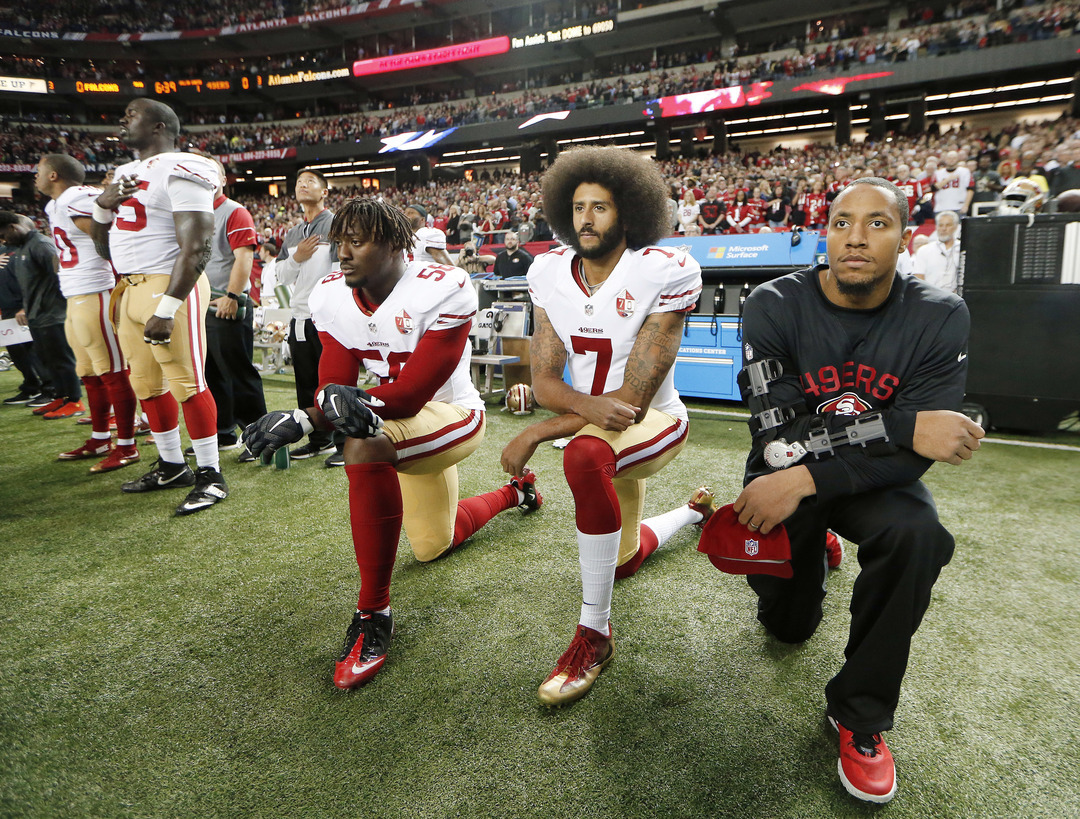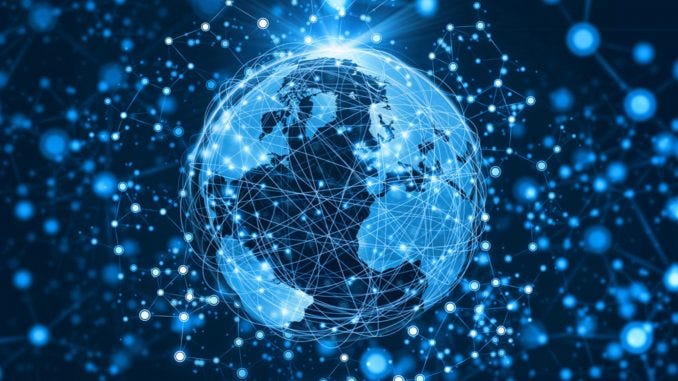
When San Francisco 49ers quarterback Colin Kaepernick first protested the national anthem in a 2016 NFL preseason game, the media did not initially notice. After several more demonstrations involving other teammates, word started to spread about what he was doing. Naturally, the American media demanded some rationale. Kaepernick explained he would not honor the flag of this country, which in his eyes continuously oppressed communities of color without mercy. His words coupled with his actions galvanized responses from both sides of the political aisle and left a lasting impression on the fight that continues against racial inequality.
The diffusion theory applies to this situation as follows:
Pioneer: Colin Kaepernick.
His display of sitting/kneeling for the anthem was the first noticeable display of the modern era of sport. A main opposing argument to Kaepernick's actions came from the kneel being seen as a sign of disrespect to the ideals of America, particularly to the armed forces of the country who hold a tight connection with the NFL. However, this statement could not be further from the truth. When planning these actions, Kaepernick consulted former Green Beret and NFL long snapper Nate Boyer. Boyer later shared a recap of their conversation in an interview with NPR to bring light to Kaepernick's case, "kneeling's never been in our history seen as a disrespectful act...soldiers often take a knee in front of a fallen brother's grave to pay respects." Despite his social justice stance and success in spreading his message, Kaepernick's on-field performance did not inspire teams to take a chance on him in the offseason. More on this later...
Early adopters: NFL players/some NBA Players
Most NFL athletes received Kaepernick's demonstrations with positive reactions. Several teams decided to forgo the anthem pre-game at some point in the season while others took a knee in solidarity. These demonstrations continued for the 2017 NFL season and seemingly became fueled by the lack of signing of Kaepernick. Of course, the situation escalated with the presidency of Donald Trump. Trump fueled the flame on both sides with divisive rhetoric including, “Wouldn’t you love to see one of these NFL owners, when somebody disrespects our flag, to say, ‘Get that son of a bitch off the field right now, out, he’s fired’." The vulgarity of Trump's comments attracted the attention of superstar NBA athletes including LeBron James and Stephen Curry, the ladder of whom refused the historic honor of visiting the White House following the Golden State Warriors' championship win in hopes that his actions would inspire change.
Early Majority: The NBA Bubble Restart in 2020
After over a year of racially-charged football headlines, anthem protesting inexplicably started to disappear. It wasn't until the George Floyd killing that once again athletes began to use their platform for bringing about social justice. This time, the voices of the African American community could not be silenced. In an effort to help bring about awareness, NBA leadership permitted its athletes to wear messages on their jerseys when the season restarted in July. According to the Undefeated, 300 of the 350 athletes participating in the restart chose a social justice message to replace their name. The Dallas Mavericks generated headlines for all of its players choosing "equality" yet having it spelled in the native languages of its players which included English, Spanish, Latvian, German, and Slovenian. Players who opted to go with their own name did not necessarily oppose the league's movement, with the Miami Heat's Jimmy Butler explaining “...with no message, no name, it’s going back to who I was. If I wasn’t who I was today, I’m no different than anybody else of color." Players also took part in pregame anthem protests to call attention to racial injustice issues.
Late Adapters: The NFL
The country's favorite league started its season after the NBA and attempted to continue the work put in place by the Association. The NFL's campaign of "It Takes All of Us" was placed on all the fields with the addition of some message individuality for the players on their helmet decor. Commissioner Roger Goodell received flack for not taking a stance sooner considering Kaepernick was a part of his league. Going back to 2016, Goodell's comments indicate he himself was unsure of how to respond to Kaepernick's actions, “Well my personal thoughts are… I support our players when they want to see change in society, and we don’t live in a perfect society. We live in an imperfect society. On the other hand, we believe very strongly in patriotism in the NFL. I personally believe very strongly in that.” New Orleans Saints Quarterback made comments in the preseason which at first appeared to oppose the demonstrations. Later though Brees apologized for the naive nature of his comments and pledged to stand for the anthem but to support the movement. In hindsight, it appears as though Goodell and Brees fell into a misunderstanding about Kaepernick's message which has seemingly happened to a mass of Americans. Kaepernick's actions were not meant as a sign of disrespect to the military (hence his conversation with Nate Boyer) but were about calling attention to the treatment of communities of color. Bridging this gap of misunderstanding still has much work to be done.
Laggards: the MLB
To use a euphemism, America's pastime has certainly seen better days. The major leagues have struggled on a variety of fronts, and social justice response is certainly one of them. Major League Baseball is uniquely positioned for its fanbase as well. Baseball is beloved by Baby Boomers and Gen X but not nearly as much of a hit with Millennials and Gen Z. It also struggles with a diversity problem. While plenty of international players continue to make Major League rosters, the league is losing African Americans to basketball and football. To put it in perspective, Bleacher Report observed that less than 8% of MLB players identified as African American in 2019 as compared to over 70% in basketball and football. Due to all these factors, the social justice response from MLB has seemed forced or superficial since its players are mostly white. The league's response post on social media to the George Floyd killing among other events came after other leagues (including the NBA, NFL, and even the NHL) and notably did not include any language mentioning the Black Lives Matter movement. Personalities, players, and fans criticized the MLB for its seemingly shallow response. Of course, none of this means that the MLB is against social justice reform. It just goes to count as another strike against "the show" and its failure to capitalize on a modern audience.
Kaepernick's actions in 2016 continue to be talked about 5 years later. He has not played a snap of professional football since the end of that season and now appears to be pivoting his professional career towards bringing about social justice reform. His actions might have indirectly cost him his career, but making a difference in the fight for racial equality certainly outweighs hoisting a lombardi trophy.
https://www.irishnews.com/magazine/daily/2017/09/25/news/a-timeline-of-the-nfl-protests-from-colin-kaepernick-s-to-now-1145483/
https://www.npr.org/2018/09/09/646115651/the-veteran-and-nfl-player-who-advised-kaepernick-to-take-a-knee
https://theundefeated.com/features/social-justice-messages-each-nba-player-is-wearing-on-his-jersey/
https://bleacherreport.com/articles/2894837-once-a-leader-of-social-justice-mlb-is-now-embarrassingly-behind-the-times
https://www.forbes.com/sites/anthonywitrado/2020/07/20/mlbs-social-justice-efforts-feel-unauthentic-unless-players-lead-the-way/?sh=56c037eb5804

No comments:
Post a Comment